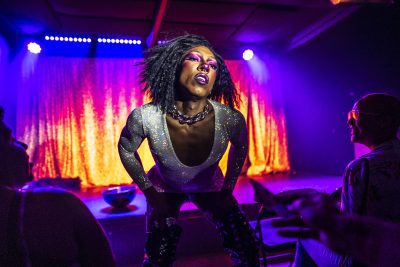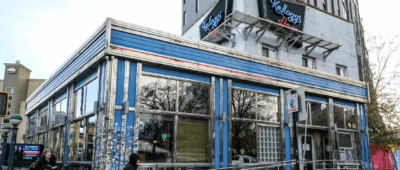Photo illustration by Joelle McKenna
Building Black-Owned Brooklyn, one story at a time
Tayo Giwa and Cynthia Gordy Giwa, the Bed-Stuy couple behind the community hub Black-Owned Brooklyn, open up on the podcast
Like what you’re hearing? Subscribe to us at iTunes, check us out on Spotify and hear us on Google, Amazon, Stitcher and TuneIn. This is our RSS feed. Tell a friend!
Black-Owned Brooklyn started in 2018 as a passion project blog to provide a curated guide to Brooklyn-based Black-owned brands, shops and businesses—and to tell the stories of the people behind those businesses.
Now, in 2021, Black-Owned Brooklyn is all of that and more. The site and its social media extensions have evolved into a vital borough-wide resource and place for community with nearly 100,000 followers on Instagram. You’ll find stories about everything from salons and cafes to a Jamaican dumpling house or an analog photography store to cosmetic tattoo studios to a history of Fort Greene’s Afropunk festival.
“It’s a documentation of culture, history and business in Black Brooklyn,” says Cynthia Gordy Giwa who runs the site with her husband Tayo Giwa from their home in Bed-Stuy. “These stories weren’t being told. The media narrative about Black people in Brooklyn is so often relegated to stories of loss and push-out and other things that are important to spotlight. But there’s this whole other universe of stories and experiences that we experience and see on a daily basis. We wanted to create a platform that celebrated them in a way that is joyful and authentic and beautiful.”
And passionate. Because Black-Owned Brooklyn is very much that: a passion project for the Giwas, who each have day jobs and aren’t making a dime off the site, which they update about once a week. The Giwas are guests on this week’s episode of “Brooklyn Magazine: The Podcast,” where they discuss what motivates them, how they approach the creation of Black-Owned Brooklyn and what’s next.
“What we strive to be is a place where we are putting front-and-center the breadth of the Black diaspora in Brooklyn in a way that is intergenerational, that is connecting people,” says Tayo Giwa. “A lot of spaces sometimes can be very siloed and we definitely want to show all that is Black Brooklyn, all the different types of people.”
A mention on Black-Owned Brooklyn can provide a measurable bump in traffic to a profiled shop. But it takes a little something special to get profiled in the first place. “We’re storytellers so we’re looking for a business with an interesting story that we find compelling might be having longstanding ties to Brooklyn,” says Cynthia, who in a previous life was a journalist who covered the Obama White House.
We discuss how far the site has come and how the pandemic has affected—and in some ways not affected—the businesses they cover. What the couple doesn’t do is obsess over the ills of gentrification, but rather they celebrate the rich tapestry of culture that not only remains in Brooklyn but is thriving.
“Regardless of the pandemic, a lot of Black businesses have been closing over the past decades as gentrification has taken root in Black neighborhoods. But at the same time, we see new Black businesses opening around us all the time,” says Cynthia. “Even over the past year. The work hasn’t slowed down in any way.”
Check out the podcast for all that and a glimpse at some of the new projects the couple are taking on, like Tayo Giwa’s short documentary about “Soul Summit,” the long running festival in Fort Greene park. You can see that here or below (after you’ve listened to the podcast.)
You might also like 


























